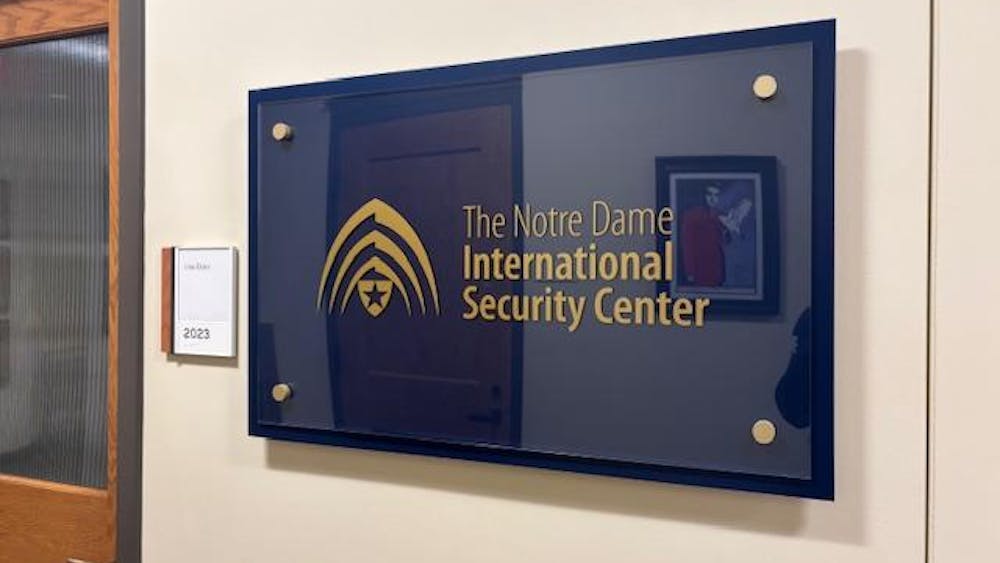For the 15th consecutive year, the University of Notre Dame ranked among the nation’s top Peace Corps volunteer-producing universities, earning the 24th spot among medium-sized colleges and universities.
The Peace Corps and the University of Notre Dame have shared a history since the agency’s establishment by President John F. Kennedy in 1961.
University President Emeritus Fr. Theodore Hesburgh encouraged involving youth as the majority of Peace Corps volunteers and created the first Peace Corps volunteer training program sponsored by a university.
Since the start of Notre Dame’s partnership with the Peace Corps, 878 Notre Dame graduates have volunteered with the Peace Corps and 13 Notre Dame alumni are currently serving abroad.
Peace Corps Director Carrie Hessler-Radelet finds similarities between the missions and experiences of the Peace Corps and Notre Dame.
“Both Notre Dame and the Peace Corps are rooted in similar missions, with a deep commitment to service and a belief in the ability of one person to make a difference,” she said. “Notre Dame equips its graduates with a strong academic foundation and a global curiosity, and the Peace Corps provides a hands-on leadership experience that offers volunteers the opportunity to travel to the farthest corners of the world while working to better the lives of others.”
Hessler-Radelet said that applicants from Notre Dame have the experience and drive valued in a Peace Corps volunteer, contributing to the University’s position as one of the Peace Corps’ top producers of volunteers.
“Peace Corps volunteers are, above all, committed to serving others,” she said. “Successful volunteers are often flexible, have an open mind and display a willingness to learn. Notre Dame graduates also bring a global awareness, cross-cultural experiences, leadership skills and a strong academic foundation that helps them to succeed.”
Meghan Costello is the Peace Corps Midwest Recruiter for Michigan and Northern Indiana and a class of 2010 Notre Dame alum.
Costello majored in political science and minored in peace studies and Italian, and immediately after graduation served in Rwanda as a Peace Corps volunteer primarily teaching English Education. Costello said her Notre Dame experience directly influenced her decision to join the Peace Corps.
“Notre Dame inspired in me a liberal arts education and a spirit of service by simply being surrounded by so many people that are passionate about making the world a better place,” she said.
Costello said her professors and course work contributed to her desire to serve.
“Notre Dame is such an amazing environment where I felt like every single professor I talked to had this unique path and ideas for the future for us and it was inspiring,” she said. “Every single person I talked to who was doing international development was doing it in so many different ways, and my peace studies classes really helped me see the options that were available.”
As a recruiter for the Peace Corps, Costello works with many young people considering a future with service because they want to make a difference in the world but may be uncertain of their path.
“I think that a lot of young people always want to make a difference and the Peace Corps is a way to not only make a difference for the community you are working with, but also making a difference for yourself because the community you work with help you grow into who you are going to be and teach you tangible skills that will help you with whatever profession you eventually will go into,” she said.
Travis Bluemling served with the Peace Corps in Indonesia from 2010-2012 and now acts as the agency’s Midwest Diversity Recruiter. Just like Costello, Bluemling talks to many young adults discerning their futures in service after college.
Bluemling said, when he talks with young people, he emphasizes how the unique experience of a Peace Corps volunteer cannot compare to other fields of work most students select immediately following graduation.
“There are a lot of things thrown at you as a student and you don’t really know which one might be the best fit, and I think the Peace Corps provides a unique experience because although we are not going into corporate America and making a lot of money right away, the idea of working with the Peace Corps and the connections and opportunities you are able to build through this experience are not even comparable,” Bluemling said.
Michael Hebbeler, the director of student leadership and senior transitions at Notre Dame, said the Peace Corps’ unique path of service as a career is one of the reasons he is grateful for Notre Dame’s continued partnership with the agency.
“Amid the pressures and forces that tell our students that they've got to get moving on their careers, gain financial security and position themselves in a society that values title, wealth and status, we have many students that push against these forces and choose paths that demand selflessness and seek the common good,” he said.
Peace Corps witnessed a 22-year application high in 2014, prompted by a reform to the application process led by Hessler-Radelet that allows students to choose countries and programs they would like to be considered for via a one-hour online application.
Hessler-Radelet said while every volunteer’s experience is different, all volunteers will gain valuable life lessons that they bring back to the United States and draw on to support their local communities.
“Serving in the Peace Corps is truly a life-changing experience for volunteers,” she said. “They integrate into their communities and develop lasting relationships that will forever change their perspective of the world.
“Peace Corps service has the power to open doors and change lives – not only in faraway countries, but also right here at home. Just as it did for me.”
Read More
Trending









